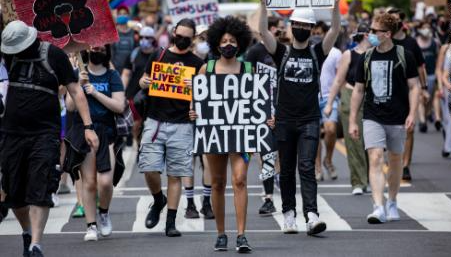Black Lives Matter Movement Inspires Change
GHS students share their thoughts on how the BLM movement has changed society.

October 21, 2020
Amidst the COVID pandemic is a movement that has swept the nation and calls for systemic change in our society: the Black Lives Matter (BLM) Movement. According to Alicia Garzi a black radical organizer, ”Black Lives Matter is an ideological and political intervention in a world where Black lives are systematically and intentionally targeted for demise. It is an affirmation of Black folks´ humanity, our contributions to this society, and our resilience in the face of deadly oppression.”
The movement really began to gain steam shortly after George Floyd was killed by a police officer in front of a lot of people on May 25 in Minneapolis, Minnesota. According to video of the event, police officer Derek Chauvin handcuffed Floyd and put his knee on his neck. Floyd struggled to breathe for 8 minutes and 46 seconds while pleading with the officers, and saying, “Please, I can’t breathe.” Civilians watching told the police officers to stop but they continued. And after Floyd died, many felt like the police used excessive force against him and began to protest against police brutality. Most rallies were peaceful, but some turned violent, with people setting things on fire and smashing windows and looting businesses.
The BLM Movement has prompted community leaders, professional athletes, celebrities and regular citizens to ask for changes in the law enforcement system. Some of these people involved in the movement have had bad experiences with police officers in the past. Junior Akayla Raasch had a bad experience with the police many years ago that has impacted her to this day. ¨I was with my mom in West Allis where we lived at the time and this car was right behind us with their lights on. We just came back from the grocery store. We couldn’t see, so we switched lanes and the red and blue lights flipped on. My mom hadn’t done anything wrong,” she said
According to Raasch, the police pulled them over and questioned her mom. “There were two officers, one by my mom’s window, and the one that got out of the squad pointed a flashlight in my face. My mom continued to ask the officer why he had stopped us, and he kept repeating, ‘An anonymous call-in of a vehicle stolen was matched to this one’,” Raasch recalled.
Raasch says that the police proceeded to ask her and her mom to get out of the car, and walk home with all the groceries, but her mom refused. “The first officer began yelling profanities at my mom. My little sister was just waking up in the backseat, I asked the officer, ‘Why is this happening? Me and my little sister are scared,she said. “That’s when the officer could tell I was only a little girl and so was my sister. He looked at his partner and told him that there were two kids in the car, and they both just walked away with the second officer saying he was sorry to me. I don’t know what would’ve happened if I didn’t say anything, but from that day three years ago I never looked at police officers the same.”
To help students deal with situations like Raasch has been in, GHS has an equity committee that is made up of students and faculty that focus on promoting a positive and diverse understanding of the school community. They work on planning campaigns and assembling activities for the whole school to learn to grow together. Junior Paris Wooden is on the equity committee and thinks that the fight for racial equality is nothing new. “We must all come together to recognize the value of human life, its importance, and how it means more than the appearance of someone’s skin tone: something we could never control,” she said. “Recognizing someone’s skin tone shouldn’t put them at a disadvantage from reaching their goals, becoming successful, or leaving a mark on the world. No matter the situation, Martin Luther King’s words will always apply to social understanding and relationships: “Judge a man not by the color of his skin but by the content of his character.”